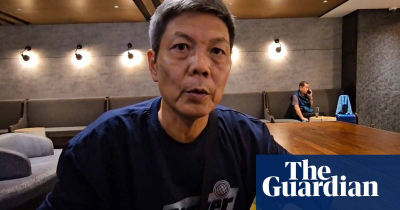The Guardian-I am willing to wait for months Chinese Tiananmen critic ready for long haul in Taiwan transit lounge
September 24, 2023 4 min 746 words
这篇报道涵盖了中国异见人士陈思明在台湾桃园国际机场滞留的故事,他因为追求安全通行到第三国而愿意在那里等待数月。他是因为定期纪念1989年6月4日天安门广场事件而闻名,这在中国内部被禁止讨论或承认。他表示,中国政府对他的打压变得“越来越残酷和疯狂”,因此他请求台湾政府帮助他在第三国(最好是美国)重新安置。他认为台湾是安全的,但他的首选是在美国工作。这种情况与2018-2019年的两名中国异见人士,严伯军和刘兴联的类似情况相似,他们在台湾机场滞留四个月后最终在加拿大重新安置。陈思明逃离中国前往老挝,并在那里获得了一年的避难ID。台湾的人权组织呼吁允许他离开机场并协助他转移到第三国。然而,台湾政府并没有提供庇护程序,但已经取消了非法抵达以寻求政治避难的刑事处罚。这个问题在台湾备受争议,因为政党和公众担心中国的渗透和间谍活动。然而,倡导者认为,应该进行背景调查等透明程序,就像其他国家一样。最终,这是一个关于中国威胁的恐惧问题,但没有建立适当系统并不是合理的解决方案。陈思明的案例凸显了许多渴望离开中国的人的处境,台湾政府需要与其他国家合作,找到保护他的方式。联合国难民署(UNHCR)尚未在台湾设立办事处,但已被联系以发表评论。这个故事涵盖了涉及人权、政治庇护和国际合作的复杂问题,需要台湾政府和国际社会的努力来解决。
A Chinese dissident who has taken refuge in a Taiwan airport during a stopover has said he is prepared to wait months if needed, in order to get safe passage to a third country.
Chen Siming is known for regularly commemorating the Tiananmen Square massacre of 4 June 1989 – an event banned from discussion or acknowledgement inside China – and has been repeatedly detained around the anniversary.
In a video posted to social media shortly after his arrival in Taiwan on Friday, Chen said that recently the authorities’ targeting of him had grown “more and more cruel and crazy”.
He is now asking the government in Taiwan to assist him in resettling in a third country, ideally the US, saying his “situation was dangerous and urgent”.
“I am willing to wait for months, because I feel safe in Taiwan,” Chen told the Guardian. “I want to go to the United States. I think Taiwan is very safe and there are no security problems. Taiwan has democracy and liberty as its shelter, so Taiwan is safe for me personally. But security is not my first option in where I settle, I have a lot of work to do in the US.”
Chen was travelling from Thailand to Guangzhou, China, transiting through Taipei’s Taoyuan international airport on Friday. He did not board the second flight, and has refused requests to return to Thailand, where he has said he fears deportation to China.
A similar case suggests Chen could be waiting some time. In 2018-2019 two Chinese dissidents, Yan Bojun and Liu Xinglian, spent four months in a Taiwan airport transit area after also flying in from Thailand and refusing to reboard a flight to Beijing. The United Nations high commissioner for refugees (UNHCR) gave them temporary asylum status, and after a long impasse, the pair flew to Singapore and were then allowed to reenter Taiwan legally on short-term humanitarian visas. They eventually resettled in Canada.
Chen told the Guardian he had fled to Laos from China in July, but was urged by friends to move on after the arrest there of human rights lawyer Lu Siwei later that month. In Bangkok he registered with the UNHCR for a refugee assessment, and said he was quickly granted a one-year asylum ID.
E-Ling Chiu, the national director of Amnesty International Taiwan, called on Taiwan’s government to allow Chen out of the airport into Taiwan and assist his transfer to a third country.
Chiu said Taiwanese authorities had previously deported asylum seekers back to their last point of departure. “If the Taiwanese government take a deportation position, they can send him back to Thailand,” she said. “But if they deport him back to China it will violate the non-refoulement principle. It’s not acceptable.”
Taiwan’s Mainland Affairs Council, which handles Taiwan-China matters, told the Guardian it was handling the case of the stranded dissident, but would not provide further details.
Taiwan does not have a refugee program that offers a pathway to protection, but it has decriminalised the act of arriving unlawfully to seek political asylum. The prospect of a streamlined refugee process is politically fraught in Taiwan, where political parties and the public cite fears of Chinese infiltration and espionage. Advocates say a proper and transparent process would see background checks carried out on applicants, as other countries do.
“It’s a fear of the threat of China, but [not having a system] is not a rational solution,” Chiu said.
William Nee, a research and advocacy coordinator for the Chinese Human Rights Defenders organisation, said there were “a lot of people desperate to leave China”, pointing to the dangerous journeys taken by Chen and Lu into Beijing-friendly Laos, and the growing number of Chinese people crossing the Darien Gap between South and Central America, into Mexico and then the US.
Taiwan’s government needed to “work constructively” with other countries to find protection for Chen, Nee said.
The UNHCR, which does not have a presence in Taiwan, has been contacted for comment.

